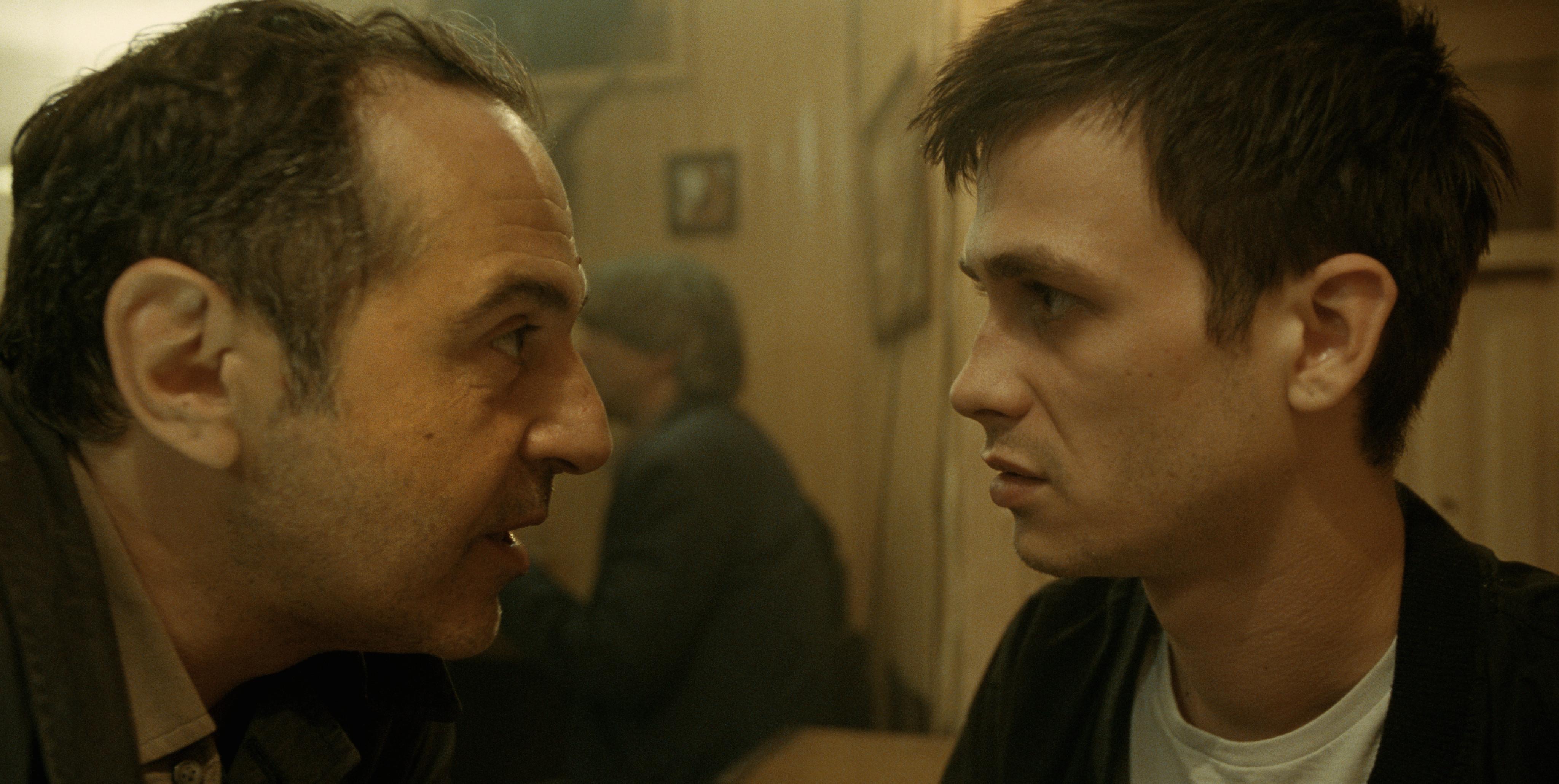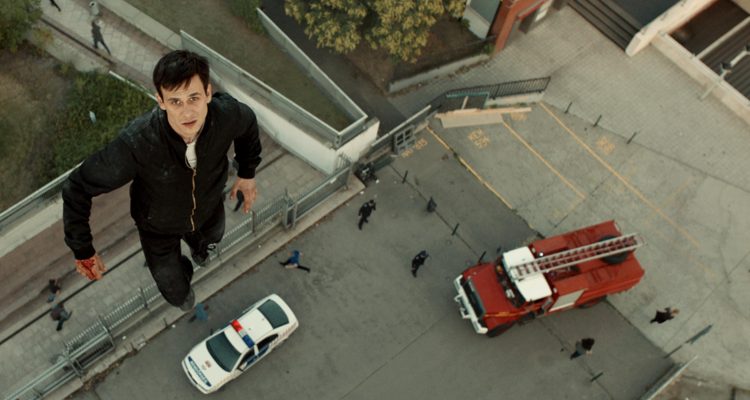As visually arresting as Kornél Mundruczó’s latest film “Jupiter’s Moon” undoubtedly is, it remains too intellectually imprisoned within its own allegorical confines to make a truly positive impact. Not 30 minutes in, after we’ve met our two protagonists and one of them has already levitated a few times, the little voice inside your head is screaming “let me out!” as the bizarre events continue to unfold at their exhaustive pace. Laden with heavy-handed religious symbolism, ‘Moon’ makes the Hungarian director’s previous feature — the infinitely better “White God” — feel almost like a documentary in comparison. How is it possible that a story tapping into the Syrian refugee crisis can sound so spectacularly original on paper, only to percolate, stagnate, and suffocate on its own ideas in a span of two hours, leaving a stale corpse of a picture in its wake?
READ MORE: The 20 Most Anticipated Films Of The 2017 Cannes Film Festival
The answer is scattered in all corners of the film. It’s the story of Aryan (Zsombor Jéger), a Syrian refugee who is caught illegally crossing the border into Europe and shot by camp-director Lazlo (György Cserhalmi) three times in the chest. He should be dead, but a few minutes pass and a shocked Aryan, miraculously, levitates off of the ground and towards the sky. Next we meet Dr. Gabor Stern (played by Merab Ninidze, but voiced by Hungarian András Bálint in a dubbing that only adds to the film’s off-kilter and jarring vibe), whose attitude towards others makes him a feared-and-hated doctor at the local refugee camp. Trying to save enough money so that he can run away with his nurse girlfriend (Móni Balsai), Stern crosses paths with Aryan at the camp and their lives become forever changed. Sort of. They’re still the same people, but Stern now finds in Aryan a quicker way to make the money he needs, selling the spectacle of Aryan’s gift to his ailing patients. Meanwhile, Lazlo is worried that Aryan will tell the authorities he was unarmed when he was shot, and decides to track him down before the boy gets him in trouble.
 That’s when “Jupiter’s Moon” turns into a chase movie that tries mightily to be something greater than that. Aryan gets separated from his father during the film’s opening sequence, and his closeness to his dad is the only personal baggage the character carries with him. When Stern asks him about his father and what he does, Aryan replies “he’s a carpenter.” Stern’s response — “nice” — is a fitting summary of the entire father-son relationship that’s intended to make us sympathize with the boy: oversimplified and lacking true depth. The religious overtones are deafening at this point, pulling you out of the film’s world with considerable force. When Stern has a run-in with two Bible-pushers in the elevator, who ask him if he believes in anything, he responds, “Hungary’s resurrection.” Kata Wéber’s screenplay is bursting at the seams with that sort of on-the-nose dialogue throughout the picture. A pivotal conversation between Aryan and Stern later in the film, about how people live their lives “horizontally,” is another shuddering example.
That’s when “Jupiter’s Moon” turns into a chase movie that tries mightily to be something greater than that. Aryan gets separated from his father during the film’s opening sequence, and his closeness to his dad is the only personal baggage the character carries with him. When Stern asks him about his father and what he does, Aryan replies “he’s a carpenter.” Stern’s response — “nice” — is a fitting summary of the entire father-son relationship that’s intended to make us sympathize with the boy: oversimplified and lacking true depth. The religious overtones are deafening at this point, pulling you out of the film’s world with considerable force. When Stern has a run-in with two Bible-pushers in the elevator, who ask him if he believes in anything, he responds, “Hungary’s resurrection.” Kata Wéber’s screenplay is bursting at the seams with that sort of on-the-nose dialogue throughout the picture. A pivotal conversation between Aryan and Stern later in the film, about how people live their lives “horizontally,” is another shuddering example.
To keep things positive, though, as a chase movie, “Jupiter’s Moon” is exemplary. Starting with the forest chase that ends in Aryan getting shot, the film is nothing if not visually impressive thanks to its stunning tracking shots. Marcell Rév’s cinematography will practically levitate your heart out of your chest as the action scenes on the streets and in the hotel pulsate with kinetic energy and magnetize you to the screen. Jed Kurzel’s symphonic, grandiose score adds beauty to the rhythm of the action, immersing you deeper still. During these five- to seven-minute interludes, all the forced ideas of Hungary’s terrible mistreatment of refugees and how a Jesus-figure will somehow absolve a nation of its sins are refreshingly forgotten as pure adrenaline takes over.
 Taking visual inspiration from the likes of “The Matrix” and “Inception,” “Jupiter’s Moon” might very well go down as so-bad-it’s-good B-movie camp. Where Mundruczó’s “White God” was subtler with its fabled allegory of Hungary’s class system, relying on voiceless dogs to pull all the right emotional chords and wrapping the tightly wound story in a beautiful coming-of-age cinematic bow, “Jupiter’s Moon” endlessly flogs the points its trying to make. That it was selected to compete for the Palme d’Or at Cannes feels more like a political than a cinematic move, but the sad irony is that the film renders a tragic real-life crisis into a gimmick that almost seems to have a derisive tone. It’s disappointing because Mundruczó’s intentions clearly come from a good place, and he is a hugely talented director. If he’d backed up his knack for visual bravura with a subtler storytelling approach, one can only imagine how much better the results would’ve been. [C+]
Taking visual inspiration from the likes of “The Matrix” and “Inception,” “Jupiter’s Moon” might very well go down as so-bad-it’s-good B-movie camp. Where Mundruczó’s “White God” was subtler with its fabled allegory of Hungary’s class system, relying on voiceless dogs to pull all the right emotional chords and wrapping the tightly wound story in a beautiful coming-of-age cinematic bow, “Jupiter’s Moon” endlessly flogs the points its trying to make. That it was selected to compete for the Palme d’Or at Cannes feels more like a political than a cinematic move, but the sad irony is that the film renders a tragic real-life crisis into a gimmick that almost seems to have a derisive tone. It’s disappointing because Mundruczó’s intentions clearly come from a good place, and he is a hugely talented director. If he’d backed up his knack for visual bravura with a subtler storytelling approach, one can only imagine how much better the results would’ve been. [C+]
Check out the rest of our coverage from the 2017 Cannes Film Festival by clicking here.

